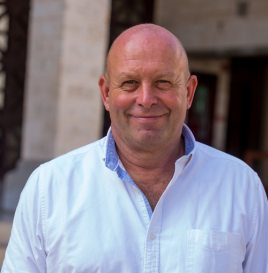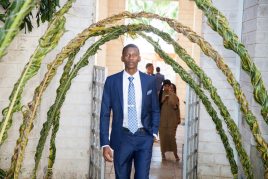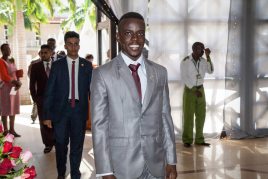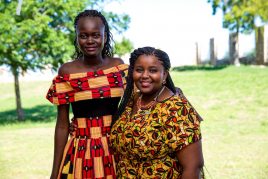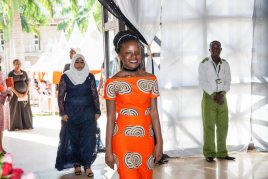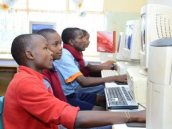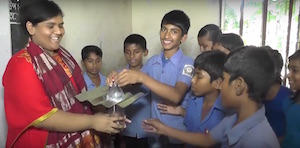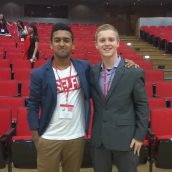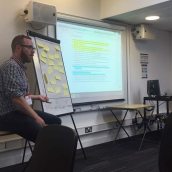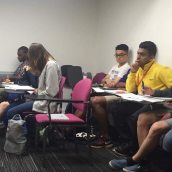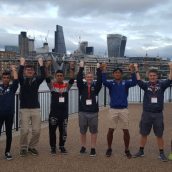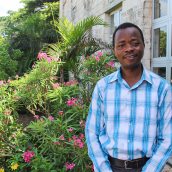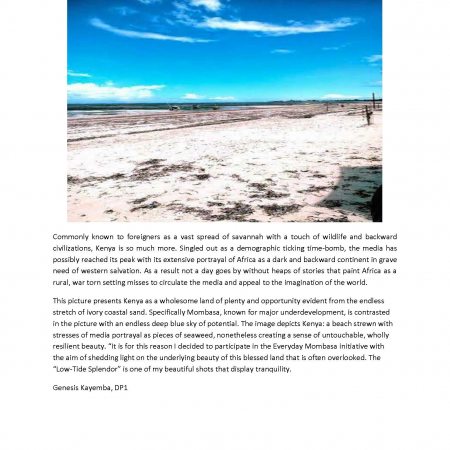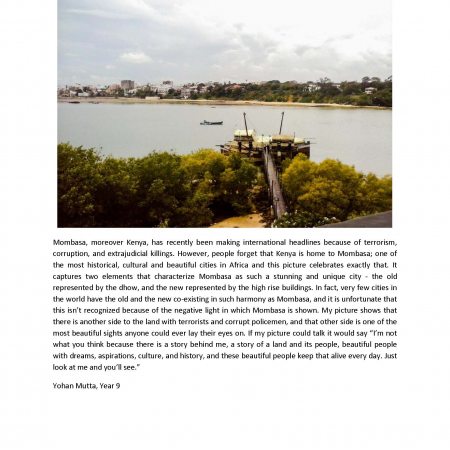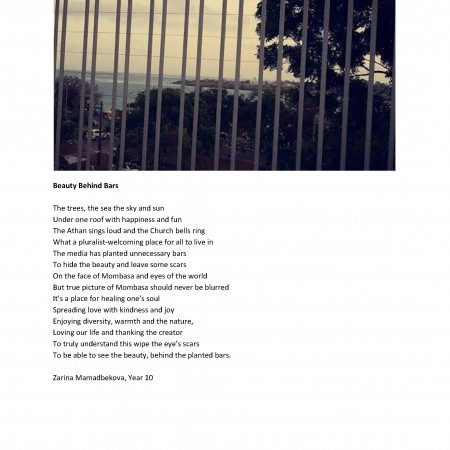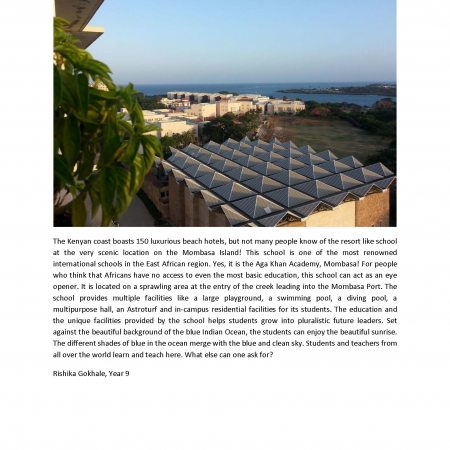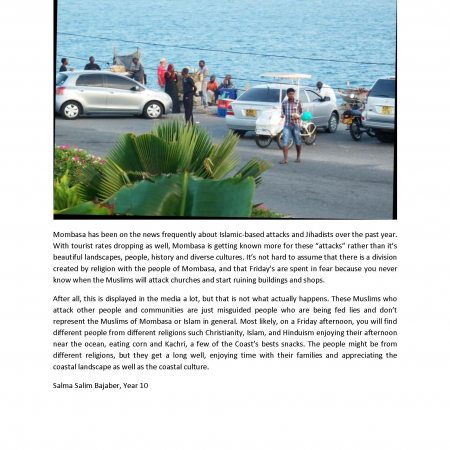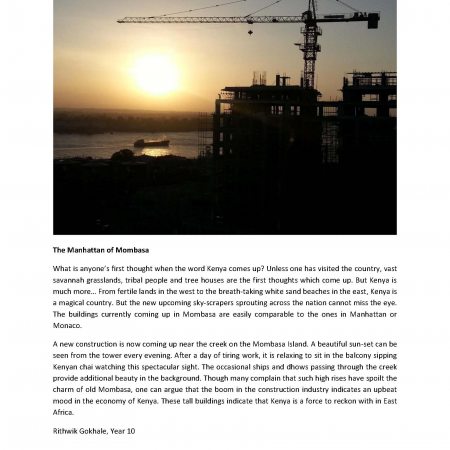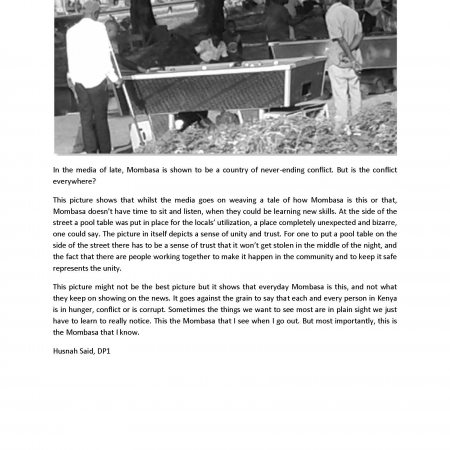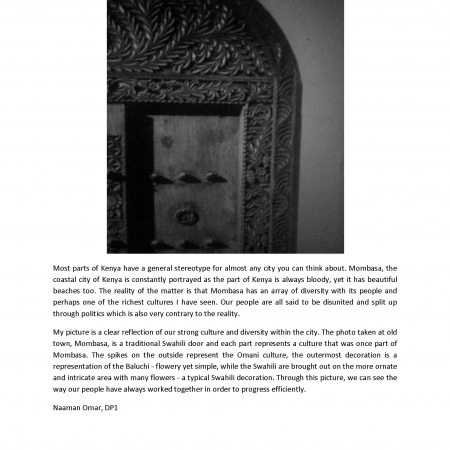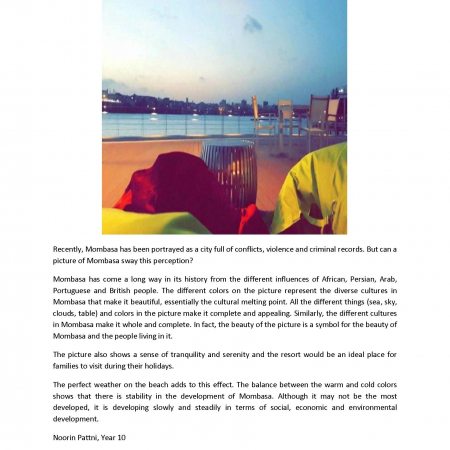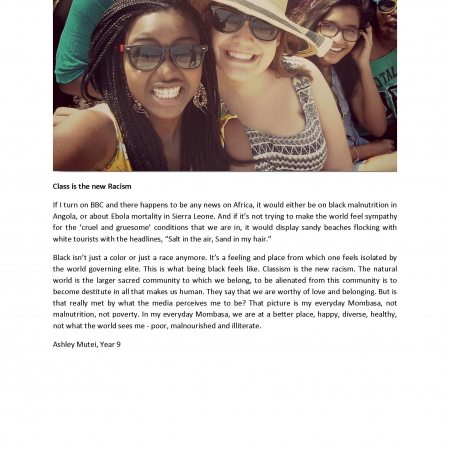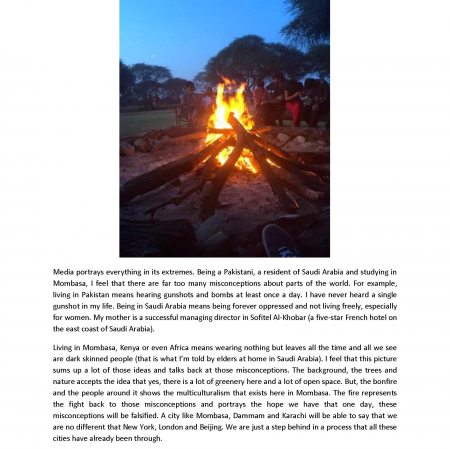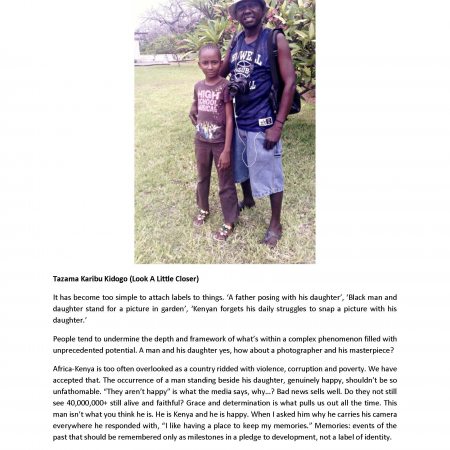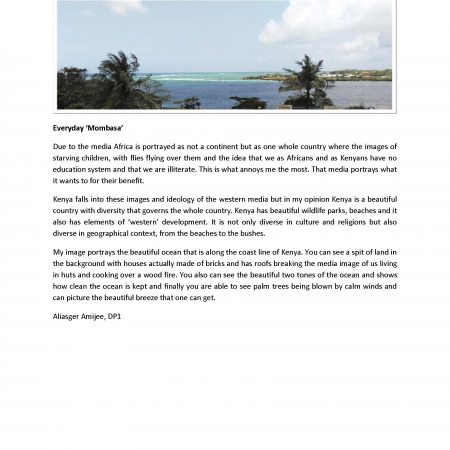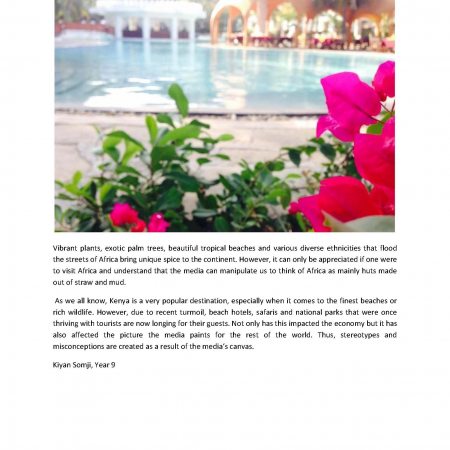Talent Identification Students: Creators of destiny
One of the great African presidents, Julius Nyerere, once said that the point of education was to turn creatures of destiny into creators of destiny. As the Dean of Admissions and Financial Aid at the Aga Khan Academy Mombasa, I have passionately led a Talent Identification Programme for nearly ten years now. The programme identifies “creators of destiny”, students in Year 6 in Kenyan government schools, in deprived socio-economic and educational areas of Kenya, who are academically able and show leadership potential. This May, seven of these students have fulfilled part of their destiny, in graduating from the IB Diploma Programme. Six of these seven students have secured a path to their next destination in life, by gaining access to some of the best universities in the world, on full scholarships. The Academy has guided and nurtured the students to have the confidence to become “creators of destiny”. The vision of His Highness the Aga Khan is that these students, as well as other members of the 2018 graduating class, will go out and be creators of change in their own communities.
As a teacher, the idea of educating a child for profit has always repelled me. The Academy’s inclusive culture was one of the factors that appealed to me when I first applied for the post at the school, as was the opportunity to lead the Talent Identification Programme. (Coming from a very working class background myself, I know that my parents would never have afforded me the opportunity to gain access to a secondary or higher education, without the assistance of the state system in the United Kingdom). From the outset, I can honestly say that not all teachers were supportive of bringing these students into the school’s residential programme. I did have a picture in my mind of how successful this could be from my work at previous schools, but I must admit, I did have sleepless nights about the scale, severity and scope of it all.
The assessment process in identifying these students has evolved and refined over the years. One very important aspect of innate leadership that is assessed is that of inferential thinking, the ability to make connections across different areas of knowledge. From this graduating cohort, I always remember one of the students exhibited exceptional ability in this area. Japheth Otieno, at the age of 11 then, referred to the inter-relation between governments causing difficulties in a problem solving activity when he mentioned, “Imagine that a Country A is helping Kenya with aid and money. Imagine that another Country B is an enemy of Kenya. Conflict may arise between Countries A and B, as there is suspicion over the reasons for this assistance to Kenya.” In the selection interviews, we look for students who are likely to question their world, have a keen sense of justice and morality, have good verbal communication skills and a sense of extra-curricular involvement. Japheth impressed me with his references to whether there was a multi-level universe or not and his passion for his kitchen garden, where he had initiated some preventative measures for protecting his plants. Japheth has now secured a place with the King-Morgridge Scholarship at the University of Wisconsin Madison in the United States.
I am delighted that this cohort sees the first student from the Ganze area, William Baya, graduating. I remember meeting William for the first time in 2011. At that time, the Kilifi County Governor reported widespread hunger in some parts of the county, especially for families living in the semi-arid areas. Learning in hundreds of primary schools in hunger-stricken parts of the country had been paralysed as the government dispatched emergency relief supplies. It was against this backdrop that we first met William, then a student at Vitengeni Primary School. William had already showed some leadership traits with him being involved as a scout commander and a school prefect. His school felt that he was a responsible and determined pupil. He mentioned about working hard in life so that he could target his goals – his motto at that time was “front ever, back never”. The self-drive William displays from adhering to this motto has guided him through the six years at the school and given him a full scholarship to attend Washington and Lee University in the United States. On learning of this, his father beaming with great pride said, “The Aga Khan Academy Mombasa has transformed my boy and that I am looking forward to him to come back and work for the community to repay the Aga Khan's contribution.”
One unique aspect of the Aga Khan Academy Mombasa, is its double heritage of world-mindedness and its proud East African identity. Since the inception of the school in 2003, Swahili has been compulsory for all students up to 14 years of age. His Highness recognised the need for young leaders to be able to communicate in their national language with other members of their community. (It is interesting to note that other non-national schools have only recently introduced Swahili into the curriculum for all students after a recent government directive). The Academy is at the forefront of academic thinking and is always forward thinking.
The development of the students in the school to “creators of destiny” is by no means left to chance. From this double heritage foundation, important concepts such as those of meritocracy, pluralism, ethics and other virtues and attributes that make up the students’ learner profile, have been integrated into all aspects of the curriculum. The students are allowed to run the risk, among other things, of failure because the privation of not succeeding can be an excellent teacher. Students are also given responsibility so that they can experience and learn from taking leadership roles. This is encouraged in every student. The students take charge in aspects of enrichment, academics and service, so that they are held accountable and answerable for their decisions, both when they get it right and when they fail.
Prudence Hainga after graduating this year will join the University of Edinburgh to study Political Science. Prudence reflected on what this scholarship meant to her and her community. “I want to realise my childhood dream of fighting injustice and corruption in Kenya. Having experienced and witnessed different levels of inequality in my country, I want to delve into a career path that will help me change what has become a detrimental routine in my country. The Kenyan political system is majorly defined by tribalism and inequality. Therefore, learning how political systems function and what others have done to ensure sustainable development as well as spread out opportunities for their citizens, will help me to decipher ways in which I could impact change in my country’s political system and rid Kenya of tribalism and greed. I am motivated to use my knowledge as a weapon against discrimination and inequality and work for a better Kenya – a Kenya that feels like home to all.”
These young men and women who have benefited from this progamme, did not have a great deal when they first came to the Academy, and their future was continually uncertain, with parents struggling to secure jobs, keep food on the table as well as educating their children. To see them grow and nurture and fulfil what was expected of them at this moment in time brings a lot of satisfaction. I have taught in many schools throughout the world, but there is something unique and special about this graduating class and other students at the school. The school recently had a visit from the representative from the International Baccalaureate Organization. On commenting on the school the one thing that stood out in my mind was his reference to the children here. He simply said that the children were “staggering”. These staggering students are helping to fulfil our mission for the Aga Khan Academy Mombasa that fits with building a better Kenya.
By Paul Davis
Junior School Student-Led Conferences..
The Academy Junior School is holding their end-of-year Student-Led Conferences (JS SLC) for current parents in the Junior School classrooms on Friday 27 May 2016, from 8.30am to 3.30pm. Refreshments will be available.
Hyderabad students march for climate action - 4:30pm, Friday 24th May
Academy staff & students will join others across the world to strike for climate justice. Venue: "Love Hyderabad" between Eat Street & People's Plaza, Necklace Road, Hyderabad.
AKA Mombasa's student, Raphael Mwachiti, wins $5000 CAD for his innovation to assist visually impaired people!
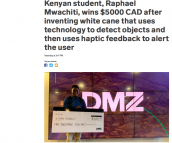
Nanjiba Sayara: Teaching students in Bangladesh to recycle plastic
My desire was realised through the grade 10 International Baccalaureate (IB) Middle Years Programme (MYP) personal project, a community project that focuses on service learning through practical exploration and a cycle of inquiry, action and reflection. As part of my personal project, I went to a village school in Bangladesh where I taught a group of about 20 students how to recycle plastic bottles, and the importance of such an activity. I chose to focus on this, because recycling plastic is needed to keep our environment safe and it’s a fun activity that would keep the students interested. Please click here to see a video of my experience at the village school.
I was privileged to work with those students, as they were very enthusiastic to learn and contribute. Spending one day with children from different backgrounds made me a better communicator. My parents and I have always believed that extracurricular activities are as important as academics because they contribute to being a balanced individual. I am happy to have done this activity at the village school because it made learning enjoyable and therefore memorable.
The IB MYP personal project was challenging, educational and exciting. My parents always ask me to share my happiness and knowledge with others because it might brighten up someone’s day. I believe my session at the village school accomplished this, so I wish to continue sharing my knowledge, what I have learned and will continue to learn, with my society.
Sahir Devani - representing the Academy at the 2017 IB World Student Conference
Sahir Devani, grade 11, shares his experience as an Academy representative at the IB World Student Conference held at King’s College London, from 6-12 August 2017.
The IB World Student Conference was one of best weeks of my life. I was one of 279 students from all over the world who gathered to explore the theme “Well-being in a healthy world: personal responsibility and global health.” It helped me to build perspectives around global health and well-being, and meet amazing people from different cultures. It was hectic, but enriching. We started our mornings with motivational, life-changing lectures led by eminent personalities representing high ranked organisations and educational institutions like UNHCR, WHO, and KCL. These were followed by sessions in smaller groups called ‘Global Action Teams’ (GAT) and mine had 19 people from eight different countries. Our difficult job was to recognise mental health issues and well-being issues in our own schools and communities, and come up with one project that would help address the issues of ALL the communities. The difficult part was that all these countries were very different - culturally, socially, economically, and geographically. Issues were many, and needed to be prioritised to change what genuinely required help. For example: in my community, substance abuse leading to mental ill-health would be alarming, but Michaela (from the United States) was pressed to address chronic depression. Therefore, in order to recognise our GAT’s responsibility, it required discussions, colliding perspectives and debate. Filled with learning, socialising, productivity, it was undoubtedly the most engaging week of my life. All participating students were either pursuing IBDP or had just graduated IB, hence the like-mindedness that was present helped us work better. Listening to stories of students from around the world, it made me realise that I was merely ‘surviving’ IB. After the conference I’ve learnt to not view it as a threat, but as a challenge. It is often seen that teenagers are victims of mental health issues as a result of academic pressure, but by embracing our learner profile and by actively participating in our CAS activities, we can successfully turn the cause into a cure. I will be working over the coming year to implement our GAT strategy at the Academy, and I’m excited!Stephen Nyundo: Fostering students’ growth through Mathematics
Before we enter the 2019 – 2020 academic term, we would like to spotlight a few staff from AKA Mombasa who are going on to pursue new adventures in the upcoming academic year. Here, we take a look at Stephen Nyundo, a Mathematics teacher and head of the department, and his five years at the Academy.
Stephen Nyundo is from the Kenyan coast, specifically from a place called Kaloleni and was the head of department for the Mathematics department at the Aga Khan Academy Mombasa. Apart from the Mathematics department, Stephen was also the year level leader for year 9.
During his five years at the Academy, Stephen said he has admired the supportive relationships he’s made, which have helped him become a better teacher.
“My experience has been enriching and very rewarding at the Academy,” Stephen said. “I have interacted with friendly and accomodating people who did not look at my weaker side. People would tell me things would be fine, even when they actually appeared otherwise. I was supported in my early years in my professional growth and got an opportunity to learn all that I needed to learn. I will miss the family, friendship, strong ties and network I’ve built here. I will definitely miss the Friday treats.”
Stephen said the ethics and values instilled at the Academy not only influenced the students, but himself as well.
“The Academy has molded me to what I now am,” Stephen said. “I will carry with me the Academy values that I am sure will propel me to greatness.”
For the Mathematics department, Stephen said he has worked with students to develop methods on helping other students who might struggle with the subject.
“A good example is 'Euler Fulfillers', a YouTube initiative by two of my Mathematics HL students who came to me with the idea,” Stephen said. “After brainstorming, we thought this was the best move where Academy students can share with their fellow students in the Academy what they know best and also help others out with challenges in Mathematics. The other platform is the ‘MathMagic’, which brought together students from all of the classes to showcase how Mathematics is applied in real-life in the various units covered. The next platform we had planned to start working on was the 'Mathletics', which is a modified form of a treasure hunt. This is where talent is found; students make use of what they have learnt in the classroom to various situations in real-life.”
After his time at the Academy, Stephen said he is ready to pursue other teaching opportunities. However, Catherine Orwe, a Mathematics teacher who works with Stephen, said he will be dearly missed at the Academy by both students and his colleagues.
“Stephen has not been just a colleague for us, but a true friend and a person with a big heart,” Catherine said. “He always made time for all even when he had tight schedules to meet. He is always very positive even when the rest of the crowd was struggling with issues. He always worked very collaboratively with colleagues to achieve our departmental goals. He pleaded with members’ input by genuinely valuing others’ ideas and expertise, and he was always willing to learn from all of us. Yes, we have learnt so much from him. He is an amazing Mathematics teacher, and I know his students here will miss him. Stephen is a person that pays attention to details in everything that you do and he is the one who would point out the changes that we needed to make in our presentations both at table and the curriculum implementation. We will definitely miss having a wonderful friend like Stephen. Good luck to him in his future endeavors! We hope the new place he goes to is full of fun and happiness.”
17 year-old Virji, Aga Khan Academy student is passionate about providing sanitary towels to girls
Daily Nation features Ziyaan Virji, CEO and founder of AASW - Affordable and Accessible Sanitation for Women - during their event in early June, marking Menstrual Hygiene Week in their efforts to raise awareness about period poverty and take action with their local partners.
Everyday Africa Photography Student Samples
Below are some student samples that they submitted to be admitted to the Everyday Africa workshop
